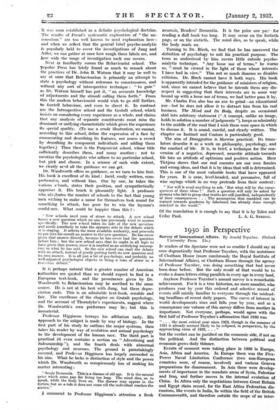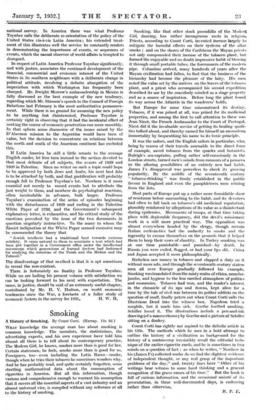193o in Perspective
Survey of International Affairs. By Arnold Toynbee. (Oxford University Press. 21s.) Ic readers of the Spectator were not so erudite I should say at once dogmatically that Professor Toynbee, with the assistance of Chatham House (more cumbrously the Royal Institute of International Affairs), or Chatham House through the agency of Professor Toynbee, was doing something that had never been done before. But the only result of that would be to evoke a dozen letters citing parallels in every age in every land,
Anyhow Professor Toynbee's annual survey is a remarkable achievement. For it is a true historian, no mere annalist, who produces year by year this ordered and selective record of events still mistily familiar to everyone through the mislead- ing headlines of recent daily papers. The curve of interest in world developments rises and falls year by year, and as a consequence one volume of this survey differs from another in importance. Not everyone, perhaps, would agree with the first half of Professor Toynbee's affirmation that 1930 was
" . . the most critical year since 1923, though in the summer of 1931 it already seemed likely to be eclipsed, in perspective, by the approaching crisis of 1932, . . "
but the verdict can be justified on the economic side, if not on the political. And the distinction between political and economic grows daily thinner.
Events of moment were taking place in 1930 in Europe, Asia, Africa and America. In Europe there was the Five- Power Naval Limitation Conference (two non-European countries were, of course, involved) and various Geneva preparations for disarmament. In Asia there were develop- ments of importance in the mandate areas of Syria, Palestine and Iraq, and further moves in the internal evolution of China. In Africa only the negotiations between Great Britain and Egypt claim record, for the East Africa Federation dis- cussions, like events in India, lie within the field of the British Commonwealth, and therefore outside the scope of an inter-
-national survey. In America there was what Professor Toynbee calls the deliberate re-orientation of the policy of the United States tris-it-vis Latin America ; his extended treat- ment of this illustrates well the service he constantly renders in demonstrating the importance of events, or sequences of ,events, which the casual observer of world affairs is tempted to disregard.
In respect of Latin America Professor Toynbee significantly, and with justice, associates the continued development of the 'financial, commercial and economic interest of the United States in its southern neighbours with a deliberate change in 'political attitude, involving a definite abnegation of the imperialism with which Washington has frequently been 'charged. Mr. Dwight Morrow's ambassadorship in Mexico is fully discussed as the best example of the new tendency, regarding which Mr. Stimson's speech to the Council of Foreign Relations last February is the most authoritative pronounce. ment. While there is no ground for assuming the new policy to be anything but disinterested, Professor Toynbee is certainly right in observing that it had the incidental effect of making the course of economic penetration run more smoothly. In that sphere some discussion of the issues raised by the D'Abernon mission to the -Argentine would have been of value, but the decision to concentrate on relations between the north and south of the American continent has excluded this.
If Latin America be still a little remote to the average English reader, let him turn instead to the section devoted to that most delicate of all subjects, the events of 1929 and 1930 in Palestine. Since no writer on such a topic could hope to be approved by both Jews and Arabs, his next best fate is to be attacked by both, and that gratification will probably enough fall to Professor Toynbee's lot. Nowhere is it more essential not merely to record events but to attribute the just weight to them, and nowhere do psychological reactions, often incalculable in advance, hulk larger. Professor Toynbee's examination of the series of episodes beginning with the disturbances of 1929 and ending in the Palestine White Paper of 1030, and the Government's subsequent explanatory letter, is exhaustive, and his critical study of the emotions provoked by the issue of the two documents in question singularly instructive. To the many to whom the Zionist indignation at the White Paper seemed excessive may he commended the 'theory that
" Jewish intellects had a traditional bent towards extreme subtlety. It came natural to them to scrutinize a text which had been•put together in a Government office under the intellectual microscope which generations of learned doctors had fashioned for studying the minutiae of the Torah and the Mishna and the Talmud.'
The disadvantage of that method is that it is apt sometimes to reveal the non-existent.
There is fortunately no finality in Professor Toynbee. While we are hailing his present volume with satisfaction we can be looking forward to his next with expectation. The same, in justice, should be said of an extremely useful chapter, contributed by Mr. H. V. Hodson, on world economic tendencies since the War, a foretaste of a fuller study of economic factors in the survey for 1931, H. W. H.







































 Previous page
Previous page